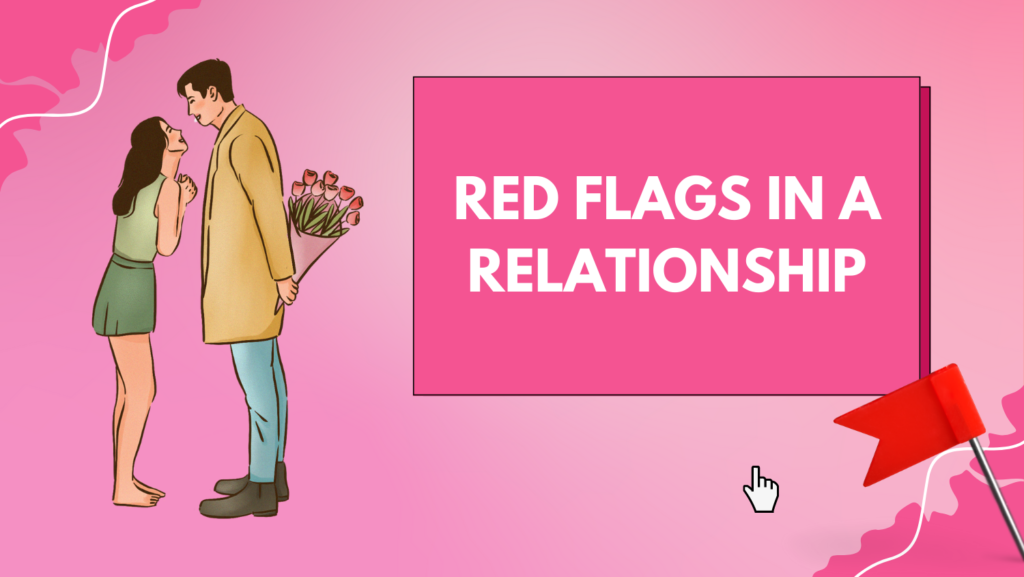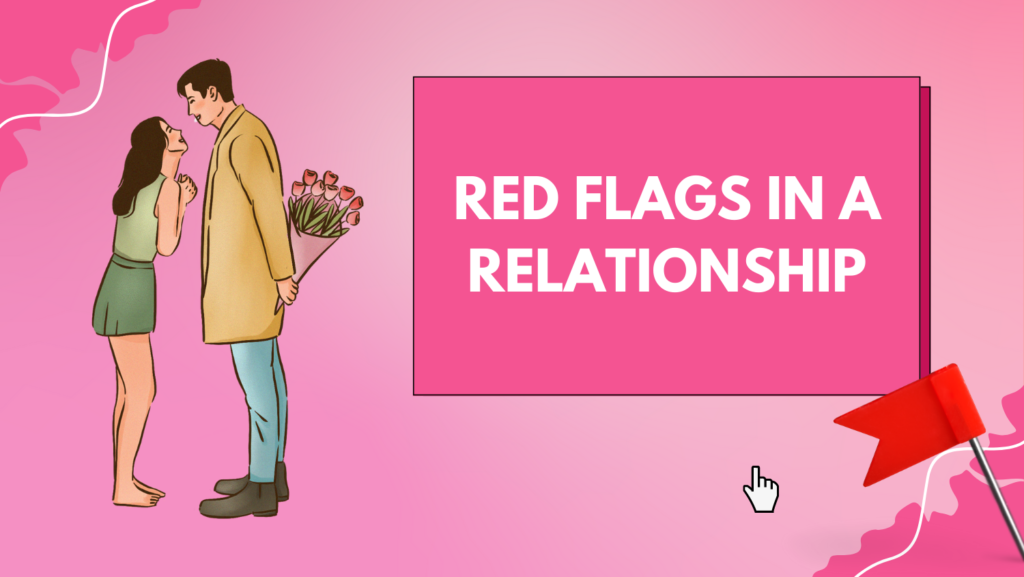-
Pingback: How to Start a Conversation on Tinder: 12 Best Dos and Don'ts
Red Flags In a Relationship Include Jealousy & Stealing (2023)

- Likewise, you should be wary of a partner who often criticizes you.
- Compromise is another major red flag – relationships shouldn’t be one-sided.
There is always a warning to stay away from people who exhibit red flags in relationships, but what exactly should we look out for?
It is possible to be unaware of warning signs when you are dating a new guy or girl, dating a long-term boyfriend or girlfriend, or even married. It is relatively common to experience emotional abuse in the form of constant put-downs.
It’s helpful to be aware of red flags so that you can proceed cautiously or cut things off if necessary.
In a relationship, what are red flags?
Red flags in a relationship indicate unhealthy patterns or behaviors.
Love and lust can cloud your judgment, especially in new relationships, making it difficult to spot red flags.
The most well-known red flags are abusive behavior and aggression. There are, however, some red flags in relationships that are easy to miss. There are toxic behaviors that can slip under the radar, such as manipulation, gaslighting, and narcissism.
Learn more about relationship red flags, why they’re easy to miss, and what to do if you see them.
1. Frequent lying
You shouldn’t constantly catch your partner being dishonest.
There is nothing wrong with telling white lies; however, if your partner is consistently deceiving or getting caught in lies, it should raise a red flag,” says Samara Quintero, a licensed marriage and family therapist.
Lies can be small, like lying about where they’re going, or big, like not telling you how much debt they have.
It is difficult to build a solid foundation in a relationship or destroy one that you’ve already built if you’ve been lied to repeatedly, Quintero says.
2. Put-downs all the time
Self-esteem can be affected by a partner who continually criticizes you or puts you down, even in a subtle or passive-aggressive manner.
The partner may feel anxious and insecure as a result of this form of emotional abuse.
She suggests the following examples as common examples:
- “You’re lucky I’m still with you because you’ll never be able to outperform me.”
- When you try to be funny, you sound so ridiculous.”
According to a 2013 study, emotional abuse could cause depression and low self-esteem just as much as physical abuse.
When your partner refuses Red Flags In a Relationship to take responsibility for their behavior or shows a willingness to change, it might be time to reevaluate your relationship, Quintero says.
3. Unwillingness to compromise
You should proceed with caution if your partner is unwilling to compromise even on little things.
If you are in a relationship with someone who seems to make everything one-sided, you may end up overcompensating and end up feeling resentful, hurt, misunderstood, and unsatisfied, says Emily Simonian, a licensed marriage and family therapist and the head of learning at Thriveworks.
It is crucial to consider each other’s needs and desires in healthy relationships, and compromise shouldn’t be one-sided.
4. Avoiding difficult topics
Relationships can be damaged by a partner who lacks the emotional or behavioral skills to cope with problems.
When things get tough, people may ignore you for days at a time or walk away from arguments without listening to you.
Simonian says that people who have trouble coping with difficult emotions often lash out or flee when the going gets tough. When things get tough, Red Flags In a Relationship even healthy relationships go through rough patches, so make sure your partner communicates effectively with you rather than running away.

5. Excessive jealousy and controlling behavior
The jealousy of your partner may lead to controlling behavior.
When you have a social life outside of your relationship, they might feel jealous, Simonian says. A jealous partner may also suffocate you with excessive calls or texts and try to control what you do.
Simonian says that control attempts usually begin subtly, but eventually grow in intensity and make you feel that nothing you do works. “If you feel smothered or consistently alter your behavior to appease their jealousy, it could be a sign of bigger problems ahead.”
According to a 2010 meta-analysis, jealousy harms romantic relationships when it increases in a relationship. Furthermore, a 2014 study found that people in relationships where the partner acted possessively early on had an unhealthy communication style later on.
6. Communication that is unhealthy or not open
Quintero says ineffective communication occurs when one partner engages in passive aggression, blames the other, or expresses emotions aggressively.
When you can’t communicate openly and healthily, you’re going to run into problems in your relationship.
In a healthy relationship, both partners can express their feelings openly without fear of judgment or criticism, says Quintero.
It has been suggested that communication early in a relationship might play a role in future relationship satisfaction, as well as that good communication early in a relationship may result in an amicable partnership in the future.
7. They don’t have any friends
It can be a red flag if your partner doesn’t have any friends of his or her own.
It may be difficult or impossible for them to maintain friendships with others. A lack of social skills, a difficult personality, or a negative view of other people could explain this.
The problem with a partner without friends is that they may be clingy or too demanding of your time, if not all of it. There is a possibility that they will not understand your desire or need to spend time with your friends, which could lead to resentment.
8. They don’t show support for you or the relationship
In a 2014 analysis of nine studies on couple relationships, commitment and support are essential for maintaining stability in a relationship.
The desire to make the relationship last isn’t enough. Rather than passively supporting their partner, people need to actively engage in behaviors that demonstrate support.
It might be a red flag if your partner isn’t actively supporting you and your relationship. There may be problems down the road as a result of this lack of commitment.
Red flags vs. yellow flags
A yellow flag is also a warning sign of potential problems. In spite of this, they may not be as obvious or insidious as red flags.
Yellow flags may be issues that can still be resolved with the right communication, and don’t need to turn into red flags. A yellow flag can, however, lead to future relationship issues, so you should be cautious.
Relationship yellow flags include:
- Taking criticism poorly
- Talking to their ex
- A lack of long-term relationship experience
- They don’t share their feelings often
A yellow flag can be annoying, but it’s not necessarily a deal breaker.
Relationship red flags: what to do when you see them
Whenever a red flag is detected in a relationship, it is best to deal with it early, honestly, and fairly. Communicate your concerns and feelings to your partner, and let them do the same.
Communicate clearly and often, and keep your emotions under control. A marriage counselor or therapist may be able to help you in some cases.
The most important thing is to be honest with yourself throughout the process, and to ask for help if you need it.
Takeaways from an insider
Take note of red flags early in a relationship.
If you run into lies, encounter possessiveness, or get put down, you should take the situation seriously and consider how it might affect your relationship not just now, but in the future as well.